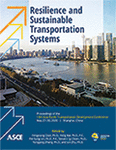13th Asia Pacific Transportation Development Conference
Effect of Heavy Transport Vehicles on Speed-Flow Characteristics of Mixed Traffic on Multi Lane Divided Intercity Highways
Publication: Resilience and Sustainable Transportation Systems
ABSTRACT
Many of the passengers and goods transportation operations are carried out by heavy transport vehicles (HTVs) like medium commercial vehicles (MCVs), heavy commercial vehicles (HCVs), and multi axle vehicles (MAVs) on multi-lane divided intercity highways. The presence of these HTVs in the traffic stream influences the overall characteristics of the traffic flow mix. The slow-speed movement of these vehicles in the median lane and kerb lane in the traffic stream affects the speed-flow characteristics of the mixed traffic, thereby deterring the speed of the other classes of vehicles, which eventually reduces the capacity of the traffic stream. The main aim of this study is to investigate and analyse the dynamic characteristics of HTVs occupying the high-speed lane (median lane) and low-speed lane (kerb lane). In order to gain a better understanding and qualitative overview of the HTVs’ movement in the traffic stream, the data acquisition process was carried out using a transportable infra-red traffic logger (TIRTL) set up across one direction of the four-lane divided highway connecting the Chennai City with Nagapattinam City in India. Using the acquired data, dynamic passenger car units (DPCU) of each vehicle is estimated, and inferences are drawn concerning HTV’s operating speed and flow. Also, a lane-based comparative study was carried out between the speed-flow characteristics of HTVs when these HTVs’ are occupying the high-speed lane and low-speed lane during their operation on the multi-lane divided intercity highways. The analysis results showed that there is a significant drop in the capacity when the HTVs are operating on the high-speed lane at speeds lower than the desired operational speed when compared to that of the capacity when the HTVs are operating on the low-speed lane.
Get full access to this article
View all available purchase options and get full access to this chapter.
ACKNOWLEDGEMENTS
The authors acknowledge the support provided by the National Highway Authority of India (NHAI), Government of India, for providing support to carry out the data collection at the National Highway (NH-32), India, for this research work.
REFERENCES
Alecsandru, C., Ishak, S., and Qi, Y. (2012). “Passenger car equivalents of trucks on four-lane rural freeways under lane restriction and different traffic conditions.” Can. J. Civ. Eng. 39, 1145–55. https://doi.org/10.1139/l2012-098.
Al-Kaisy, A., Jung, Y., and Rakha, H. (2005). “Developing Passenger Car Equivalency Factors for Heavy Vehicles during Congestion.” J. Transp. Eng., 131, 514–523.
Al-Zerjawi, A. K. R. (2016). “Estimation of Free Flow Speeds and Passenger Car Equivalent Factors for Multilane Highways.” Int. J. Sci. Eng. Res., 7, 721–727
Arkatkar, S., Velmurugan, S., Puvvala, R., Ponnu, B., and Narula, S. (2016). “Methodology for Simulating Heterogeneous Traffic on Expressways in Developing Countries: A Case Study in India.” Transp. Lett., 00: 1–16.
Demarchi, S. H., and Setti, J. R. (2007). “Limitations of Passenger-Car Equivalent Derivation for Traffic Streams with More Than One Truck Type.” Transp. Res. Rec., Journal of the Transportation Research Board, 1852: 96–104.
Indian Highway Capacity Manual (Indo-HCM), (2017), Central Road Research Institute, New Delhi, India.
Kong, D., Guo, X., Yang, B., and Wu, D. (2016). “Analyzing the Impact of Trucks on Traffic Flow Based on an Improved Cellular Automaton Model. ” Discrete Dynamics in Nature and Society. 1–14. https://doi.org/10.1155/2016/1236846.
Moridpour, S., Mazloumi, E., and Mesbah, M. (2015). “Impact of heavy vehicles on surrounding traffic characteristics,” J. Adv. Transp, 49(4), 535–552.
Webster, N., and Elefteriadou, L. (1999). “A Simulation Study of Truck Passenger Car Equivalents (PCE) on Basic Freeway Sections.” Transp. Res. Part B: Methodological, 33: 323–336. https://doi.org/10.1016/S0965-8564(98)00036-6.
Information & Authors
Information
Published In
Resilience and Sustainable Transportation Systems
Pages: 176 - 185
Editors: Fengxiang Qiao, Ph.D., Texas Southern University, Yong Bai, Ph.D., Marquette University, Pei-Sung Lin, Ph.D., University of South Florida, Steven I Jy Chien, Ph.D., New Jersey Institute of Technology, Yongping Zhang, Ph.D., California State Polytechnic University, and Lin Zhu, Ph.D., Shanghai University of Engineering Science
ISBN (Online): 978-0-7844-8290-2
Copyright
© 2020 American Society of Civil Engineers.
History
Published online: Jun 29, 2020
Published in print: Jun 29, 2020
Authors
Metrics & Citations
Metrics
Citations
Download citation
If you have the appropriate software installed, you can download article citation data to the citation manager of your choice. Simply select your manager software from the list below and click Download.
